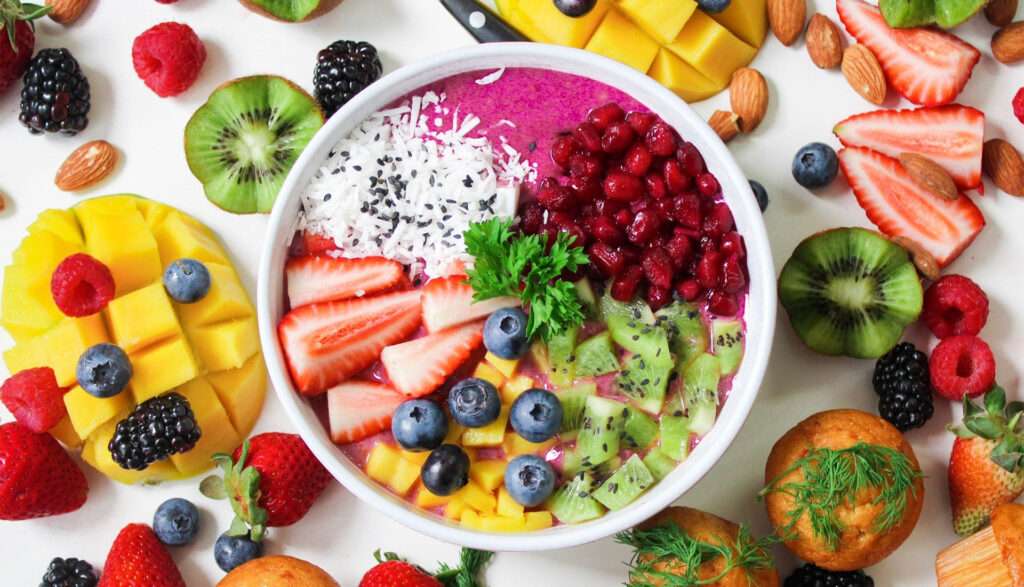Fueling your body is important regardless of your athletic ability. We all know to consume greens and protein, but what does it mean when you’re active? The appropriate sports nutrition may improve performance and recovery, whether you’re preparing for a marathon or just feeling good at lunchtime workouts. This article will explain what to eat and when to maintain energy, strengthen and repair muscles, and acquire all the necessary nutrients. No fancy diets or superfoods here! Real talk about real meals to prepare for your next workout. Let’s dig!
About Sports Nutrition
Nutrition for Sport
Sports nutrition provides the necessary fuel and nutrients to function well throughout the exercise. This requires creating feeding strategies to:
• Boost energy
• Stay hydrated
• Build and maintain muscle
• Assisting recovery
Your nutrition strategy depends on your endurance, strength, team or recreational activity, and personal objectives and demands.
Main Benefits
Following sports nutrition guidelines can offer benefits like:
• Enhanced energy and endurance
• Enhanced training intensity and duration
• Faster recovery periods
• Maintaining a healthy weight
• Lowering injury or sickness risk
Proper nutrition for sports supports your body and makes you feel terrific during exercises and contests.
Where to Start
To start with sports nutrition, consult a registered dietitian or experienced sports nutritionist to create a customized eating plan based on your body and activity level.
• Ensure proper hydration and consume sufficient calories from nutrient-rich carbohydrates, proteins, fruits, and vegetables.
• Adjust meal and snack timing to fit workouts.
Fueling wisely can help you reach your fitness and health goals!
Key Nutrients for Athletes

To perform well, recover, and stay healthy, athletes need the correct nutrients. Get enough of these Sports Nutritions:
The primary energy source is carbs. Oats, sweet potatoes, quinoa, whole grain bread, and pasta are high-fiber carbs—carb-rich meals and snacks before and after workouts to replace glycogen.
Protein is essential for muscle growth, repair, and maintenance. Lean meats, eggs, dairy, beans, almonds, and soy are good sources. Aim for protein at every meal and snack.
Healthy Fats—Energize, promote metabolism, absorb nutrients, and reduce inflammation. Eat olive oil, nuts, seeds, avocado, and salmon for fat.
Vitamins and minerals assist energy, bone, immunological, and other functions. Enjoy a variety of fruits and vegetables and take a multivitamin.
Remember fluids! Hydration improves endurance, avoids cramps and weariness, regulates body temperature, delivers nutrients, and lubricates joints. Drink water and sports drinks before, during, and after exercise.
Proper fueling can improve stamina, strength, healing, injury risk, and daily well-being. A sports dietitian or sports nutrition can help you customize your sports feeding plan.
Best Foods for Sports Performance
Your body requires the correct foods, timing, and hydration to fuel muscles during exercise. Eating well before, during, and after exercise can improve your body’s performance.
Pre-Workout
• Include complex carbs like whole grain oats, brown rice, or quinoa. These give you long-lasting workout vigor. Have 1-4 hours before workout.
• Include protein like eggs, Greek yogurt, or nut butter on healthy grain toast. Protein builds and repairs muscle. Eat 30-60 minutes before exercise.
• Bananas and apples offer quick-acting carbs for energy before exercise. About 30 minutes ahead.
During exercising
• Sports drinks with carbs and electrolytes aid hydration and energy during prolonged exercise over 60 minutes.
• Granola bars, energy chews, and fruit slices provide a carbohydrate boost during low energy levels. Choose quickly digesting foods.
Post-Workout/Recovery
Chocolate milk provides the optimal carb-to-protein ratio for replenishing weary muscles. After finishing, drink within 30 minutes.
• Lean proteins such as chicken, fish, vegetables, and whole grains aid muscle recovery. Eat within 2 hours.
• The chemicals in tart cherry juice lessen inflammation and muscular discomfort.
Focusing on nutrition before, during, and after exercise helps your body perform at its best every time. Performance, endurance, and recovery can improve with good sports nutrition.
When to Eat for Optimal Fueling

Fueling correctly before and after workouts helps you perform well and recover swiftly. Follow these essential fuelling tips:
Before exercise – Eat 1-4 hours before workout. Carbs like bananas, cereal, and whole-grain toast replenish muscle glycogen. Add yogurt or eggs for protein. Stay hydrated.
During exercise – Ideal exercise intervals are 45-60 minutes. Sports drinks, energy gels, granola bars, and bananas help. Focus on fast-digesting carbohydrates. Hydrate well.
After exercise – Eat 45 minutes after exercise. Prioritize carbs and protein for glycogen and muscle restoration. Chocolate milk, Greek yogurt with berries and granola, eggs on toast, and recovery shakes are options.
Morning workouts – Make time for pre-workout nourishment in the morning. Otherwise, eat heartily the night before.
Evening workouts: Follow the feeding instructions above. Have peanut butter crackers before dinner if it’s over an hour away.
Strength sessions – For adequate muscle glycogen, strength training is essential. Take the customary counsel—post-workout nutrition matters.
Low intensity or skills—light fuelling usually works. Focus on hydration. Save bigger meals for tough sessions.
Race day: Eat familiar, easily digestible foods. Eat a small carb-rich meal 2-4 hours before the race, then lighter snacks. Hydrate healthy days prior.
Supplements for Sports Nutrition: Do You Need Them?
Sports nutrition and fitness enthusiasts may wonder if they require supplements. Some guidelines to help you decide:
•Protein: Its intake is crucial for muscle development and repair. If you can’t get enough protein from whole meals, protein powders are a practical method to supplement. They also speed up post-workout recovery. Whey and casein are popular.
•Pre-Workout – These supplements enhance energy, strength, focus, and endurance, including caffeine, creatine, amino acids, and beta-alanine. Many athletes use them for training intensity. Avoid overdosing on stimulants, which might create adverse effects. Maintain the recommended serving.
•Amino Acids – Essential amino acids, such as leucine, promote muscle protein synthesis for development and recovery. BCAA supplements can inhibit exercise-induced muscle breakdown. They preserve energy and focus.
Creatine – Creatine can considerably improve high-intensity muscular performance. Lean body mass, one of the most researched vitamins, can be gained with creatine loading and maintenance dosages.
Fat Burners – Supplements like green tea, caffeine, raspberry ketones, or capsaicin claim to enhance metabolism and burn calories and fat. Results can vary greatly. Better nutrition and exercise work better.
Testosterone Boosters – D-aspartic acid, fenugreek, and DHEA are claimed to increase testosterone levels. Evidence of their efficacy is varied. Talk to your doctor before taking hormone-altering substances.
Supplements should support healthy diets, not replace them. Your doctor, trainer, or nutritionist can prescribe what’s best for your fitness goals and sport. Avoid unregulated or stimulant-heavy supplements and start with protein, creatine, or pre-workout.
Conclusion
Sports nutrition boiled down to what to consume and when. Add whole grains, fruits, veggies, and lean proteins to your diet. Plan your meals and snacks around workouts. Focus on carbs for intensive training and protein for muscle restoration. Stay hydrated and listen to your body. Only complete foods are needed, not supplements. With these sports’ nutrition principles, you can confidently nourish your body to reach your athletic performance objectives. Motivate yourself and excel!
Our Services include the best healthy eating habits, nutrition guides, diet, nutrition plans and newsdailytime.
FAQs
How soon before exercise should I eat?
Eat 1-4 hours before exercise. Eat a light, carb-rich lunch with little fat or protein. It gives your body time to metabolize without making you sluggish. Oatmeal with fruit, whole grain toast with jam, or banana with yogurt are options.
What is the optimal workout fuel?
Look for snacks containing carbs for energy and protein for muscle restoration. Peanut butter and banana sandwiches, Greek yogurt with granola, trail mix with nuts/seeds/dried fruit, and energy bars with 10-15 grams of carbs and protein are good options. Stay hydrated with water or sports drinks.
Should I eat post-workout?
Refuel within 30-60 minutes post-workout to replenish glycogen and muscle repair. Carbs and protein are in chocolate milk, vegetable pizza, turkey sandwiches, and fruit smoothies.
How soon can I shower after eating?
Wait 45-60 minutes before showering after a big meal. Allowing time for digestion prevents discomfort. A 30-minute gap is acceptable after a light pre/post-workout snack.
Do protein supplements aid muscular growth?
Whey and plant-based protein supplements can supplement whole food sources for muscle building. Before taking supplements, get enough protein from your diet. Eat breakfast, post-workout, and before bed.
Do I need sports nutrition drinks when exercising?
Water works for under-60-minute activities. Sports beverages contain electrolytes, carbohydrates, and fluids for performance and hydration during workouts. Limit calories and sweets.
What food rules should I follow?
Promote nutrient-dense fruits, vegetables, lean protein, dairy, eggs, legumes, nuts, seeds, and whole grains. Stay hydrated and listen to your body. Balance all foods by activity level. Joy, variety, and moderation are essential!
Must Read: Balanced Body and Mind

